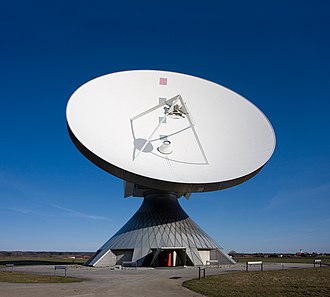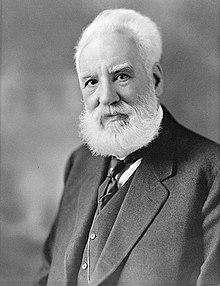Portal:Telecommunication
The Telecommunication Portal

Telecommunication, often used in its plural form or abbreviated as telecom, is the transmission of information with an immediacy comparable to face-to-face communication. As such, slow communications technologies like postal mail and pneumatic tubes are excluded from the definition. Many transmission media have been used for telecommunications throughout history, from smoke signals, beacons, semaphore telegraphs, signal flags, and optical heliographs to wires and empty space made to carry electromagnetic signals. These paths of transmission may be divided into communication channels for multiplexing, allowing for a single medium to transmit several concurrent communication sessions. Several methods of long-distance communication before the modern era used sounds like coded drumbeats, the blowing of horns, and whistles. Long-distance technologies invented during the 20th and 21st centuries generally use electric power, and include the telegraph, telephone, television, and radio.
Early telecommunication networks used metal wires as the medium for transmitting signals. These networks were used for telegraphy and telephony for many decades. In the first decade of the 20th century, a revolution in wireless communication began with breakthroughs including those made in radio communications by Guglielmo Marconi, who won the 1909 Nobel Prize in Physics. Other early pioneers in electrical and electronic telecommunications include co-inventors of the telegraph Charles Wheatstone and Samuel Morse, numerous inventors and developers of the telephone including Antonio Meucci, Philipp Reis, Elisha Gray and Alexander Graham Bell, inventors of radio Edwin Armstrong and Lee de Forest, as well as inventors of television like Vladimir K. Zworykin, John Logie Baird and Philo Farnsworth.
Since the 1960s, the proliferation of digital technologies has meant that voice communications have gradually been supplemented by data. The physical limitations of metallic media prompted the development of optical fibre. The Internet, a technology independent of any given medium, has provided global access to services for individual users and further reduced location and time limitations on communications. (Full article...)
Selected article -

A smartphone, often simply called a phone, is a mobile device that combines the functionality of a traditional mobile phone with advanced computing capabilities. It typically has a touchscreen interface, allowing users to access a wide range of applications and services, such as web browsing, email, and social media, as well as multimedia playback and streaming. Smartphones have built-in cameras, GPS navigation, and support for various communication methods, including voice calls, text messaging, and internet-based messaging apps.
Smartphones are distinguished from older-design feature phones by their more advanced hardware capabilities and extensive mobile operating systems, access to the internet, business applications, mobile payments, and multimedia functionality, including music, video, gaming, radio, and television. (Full article...)
General images
Things to do
 |
Here are some tasks awaiting attention:
|
Selected biography -
Alexander Graham Bell (/ˈɡreɪ.əm/, born Alexander Bell; March 3, 1847 – August 2, 1922) was a Scottish-born Canadian-American inventor, scientist, and engineer who is credited with patenting the first practical telephone. He also co-founded the American Telephone and Telegraph Company (AT&T) in 1885.
Bell's father, grandfather, and brother had all been associated with work on elocution and speech, and both his mother and wife were deaf, profoundly influencing Bell's life's work. His research on hearing and speech further led him to experiment with hearing devices, which eventually culminated in his being awarded the first U.S. patent for the telephone, on March 7, 1876. Bell considered his invention an intrusion on his real work as a scientist and refused to have a telephone in his study. (Full article...)
Did you know (auto-generated) -

- ... that the 40-foot radio telescope at Green Bank Observatory was the first automated telescope?
- ... that in 1982, a news anchor for Phoenix television station KOOL-TV was held hostage on set for five hours?
- ... that the founding manager of an Oregon radio station named it after his wife's former name?
- ... that the Voice of Freedom had to counter venomous snakes, leeches, and other wildlife?
- ... that John Wesley Shipp, who played the Flash in the 1990 television series, was cast as his father in the pilot episode of 2014's The Flash?
- ... that Amdek Corporation, a popular manufacturer of computer monitors in the 1980s, started out as a reseller of car radio components?
Related portals
Topics
Subcategories
Associated Wikimedia
The following Wikimedia Foundation sister projects provide more on this subject:
-
Commons
Free media repository -
Wikibooks
Free textbooks and manuals -
Wikidata
Free knowledge base -
Wikinews
Free-content news -
Wikiquote
Collection of quotations -
Wikisource
Free-content library -
Wikiversity
Free learning tools -
Wiktionary
Dictionary and thesaurus





























































































